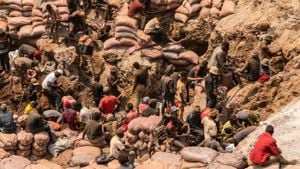Friction between India and Canada has reached alarming heights after serious allegations surfaced tying the Indian government to a string of violent actions targeting Sikh separatists, particularly those residing on Canadian soil. The accusations culminated with the murder of Sikh activist Hardeep Singh Nijjar, who held significant influence within the Khalistan movement, advocating for a separate Sikh homeland.
This high-profile case began when Nijjar was shot dead outside of his temple in British Columbia in June 2023. Since then, Canadian authorities have indicated they have credible evidence linking Indian intelligence to his assassination. The tensions escalated on October 14, 2024, when Deputy Foreign Affairs Minister David Morrison confirmed to the Canadian Parliament his belief, supported by intelligence sources, implicates Indian Home Minister Amit Shah as orchestrator of operations against Sikh separatists abroad.
Prime Minister Justin Trudeau previously revealed these allegations, claiming agents tied to the Indian government were responsible for Nijjar's murder. This led to dramatic diplomatic fallout, with Canada expelling the Indian high commissioner and five other diplomats, showcasing the growing disdain toward what many view as India's infringements on Canadian sovereignty.
While the Indian government has persistently denied any wrongdoing, asserting these claims are baseless, the U.S. has jumped onto the fray. The situation caught the attention of the Department of Justice, which unveiled charges against Vikash Yadav, said to be connected to another plot targeting Gurpatwant Singh Pannun, another prominent Sikh activist known for his vocal opposition to the Indian government.
Adding more weight to these allegations, when Morrison faced questions from Parliament, he did not specify the means by which Canada gathered evidence on Shah's alleged involvement but confirmed his name following inquiries from media personnel.
The Canadian intelligence community's actions have raised eyebrows, especially as Morrison noted they have repeatedly shared intelligence on these matters with their Indian counterparts. Yet, India continues to dismiss Ottawa's assertions, labeling them as attempts to provoke tensions and discredit its government.
Further complicity of international interests involves the U.S., which has also reportedly stopped assassination attempts directed at Sikh activists residing on its soil. The Justice Department's criminal charges reveal troubling patterns where violent acts against dissidents seem to be coordinated from Indian soil, posing serious diplomatic challenges not just for Canada but for its allies.
The Royal Canadian Mounted Police (RCMP) has supported investigations indicating wider networks involving violent criminal activities stemming from Indian government agents. Allegations include harassment and intimidation aimed at silencing dissenters and activists opposing New Delhi's policies.
Even more alarming is the mention of criminal networks, including the notorious Bishnoi gang, potentially collaborating with Indian officials to target individuals advocating for Khalistani independence. The RCMP has suggested these illicit activities mirror organized crime rather than statecraft.
India’s approach centers around national security and safeguarding its interests, vehemently denying responsibility for international operations against Sikh identities. But with heightened scrutiny from both Canadian authorities and American law enforcement, the Indian government faces immense pressure to clarify its position and curtail any illicit overseas operations.
The U.S. State Department has expressed concern over Canada’s allegations, promising to engage and consult with Canadian officials moving forward. This acknowledgment of the claims against India straddles the fine line between bilateral relations and the troubling dynamics of international law.
If true, this scenario could redefine India's global interactions, particularly with Western nations like Canada and the U.S., who have historically valued diplomacy but are now under pressure to address alleged state-sanctioned violence.
Experts say the ramifications could be vast, affecting not just Canada-India ties but also how India is perceived on the global stage as it grapples with its domestic and international policies. The backdrop of Modi's government, marked by fervent nationalist sentiments, complicates matters, as oppositional voices become overshadowed by aggressive posturing.
The cases of Nijjar and Pannun represent more than just individual tragedies; they are symbolic of wider struggles connected to identity, belonging, and the right to dissent. Whether this will lead to diplomatic thawing or deepen existing divides remains to be seen, as investigations continue and public consciousness grows about the stakes involved.
Returning to the themes of autonomy and security, the governments involved are at notable crossroads. Stakeholders eagerly await clarity and accountability as diplomatic discussions continue amid rising tensions.
This situation encapsulates the challenges facing modern democracies, balancing security and respect for laws against the persistent clamor for rights and freedoms by various community groups, especially minorities like Sikhs. They are not merely seeking protection but recognition and respect on both domestic and international fronts.



